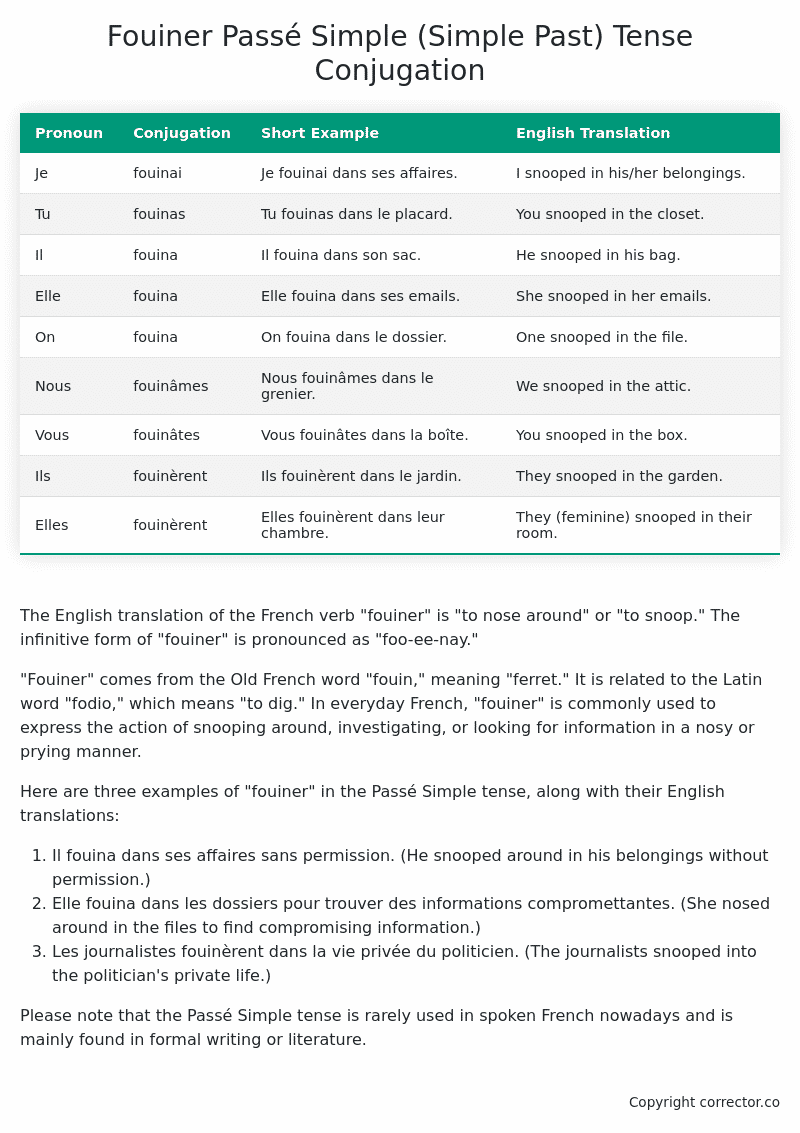Passé Simple (Simple Past) Tense Conjugation of the French Verb fouiner
Introduction to the verb fouiner
The English translation of the French verb “fouiner” is “to nose around” or “to snoop.” The infinitive form of “fouiner” is pronounced as “foo-ee-nay.”
“Fouiner” comes from the Old French word “fouin,” meaning “ferret.” It is related to the Latin word “fodio,” which means “to dig.” In everyday French, “fouiner” is commonly used to express the action of snooping around, investigating, or looking for information in a nosy or prying manner.
Here are three examples of “fouiner” in the Passé Simple tense, along with their English translations:
- Il fouina dans ses affaires sans permission. (He snooped around in his belongings without permission.)
- Elle fouina dans les dossiers pour trouver des informations compromettantes. (She nosed around in the files to find compromising information.)
- Les journalistes fouinèrent dans la vie privée du politicien. (The journalists snooped into the politician’s private life.)
Please note that the Passé Simple tense is rarely used in spoken French nowadays and is mainly found in formal writing or literature.
Table of the Passé Simple (Simple Past) Tense Conjugation of fouiner
| Pronoun | Conjugation | Short Example | English Translation |
|---|---|---|---|
| Je | fouinai | Je fouinai dans ses affaires. | I snooped in his/her belongings. |
| Tu | fouinas | Tu fouinas dans le placard. | You snooped in the closet. |
| Il | fouina | Il fouina dans son sac. | He snooped in his bag. |
| Elle | fouina | Elle fouina dans ses emails. | She snooped in her emails. |
| On | fouina | On fouina dans le dossier. | One snooped in the file. |
| Nous | fouinâmes | Nous fouinâmes dans le grenier. | We snooped in the attic. |
| Vous | fouinâtes | Vous fouinâtes dans la boîte. | You snooped in the box. |
| Ils | fouinèrent | Ils fouinèrent dans le jardin. | They snooped in the garden. |
| Elles | fouinèrent | Elles fouinèrent dans leur chambre. | They (feminine) snooped in their room. |
Other Conjugations for Fouiner.
Le Present (Present Tense) Conjugation of the French Verb fouiner
Imparfait (Imperfect) Tense Conjugation of the French Verb fouiner
Passé Simple (Simple Past) Tense Conjugation of the French Verb fouiner (You’re reading it right now!)
Passé Composé (Present Perfect) Tense Conjugation of the French Verb fouiner
Futur Simple (Simple Future) Tense Conjugation of the French Verb fouiner
Futur Proche (Near Future) Tense Conjugation of the French Verb fouiner
Plus-que-parfait (Pluperfect) Tense Conjugation of the French Verb fouiner
Passé Antérieur (Past Anterior) Tense Conjugation of the French Verb fouiner
Futur Antérieur (Future Anterior) Tense Conjugation of the French Verb fouiner
Subjonctif Présent (Subjunctive Present) Tense Conjugation of the French Verb fouiner
Subjonctif Passé (Subjunctive Past) Tense Conjugation of the French Verb fouiner
Subjonctif Imparfait (Subjunctive Imperfect) Tense Conjugation of the French Verb fouiner
Subjonctif Plus-que-parfait (Subjunctive Pluperfect) Tense Conjugation of the French Verb fouiner
Conditionnel Présent (Conditional Present) Tense Conjugation of the French Verb fouiner
Conditionnel Passé (Conditional Past) Tense Conjugation of the French Verb fouiner
Conditionnel Passé II (Conditional Past II) Tense Conjugation of the French Verb fouiner
L’impératif Présent (Imperative Present) Tense Conjugation of the French Verb fouiner
L’impératif Passé (Imperative Past) Tense Conjugation of the French Verb fouiner
L’infinitif Présent (Infinitive Present) Tense Conjugation of the French Verb fouiner
L’infinitif Passé (Infinitive Past) Tense Conjugation of the French Verb fouiner
Le Participe Présent (Present Participle) Tense Conjugation of the French Verb fouiner
Le Participe Passé (Past Participle) Tense Conjugation of the French Verb fouiner
Struggling with French verbs or the language in general? Why not use our free French Grammar Checker – no registration required!
Get a FREE Download Study Sheet of this Conjugation 🔥
Simply right click the image below, click “save image” and get your free reference for the fouiner Passé Simple tense conjugation!

Fouiner – About the French Passé Simple (Simple Past) Tense
Formation
Usage
Narration
Historical Context
Interactions with other tenses
Passé Composé
Imparfait
Conditional and Subjunctive
Summary
I hope you enjoyed this article on the verb fouiner. Still in a learning mood? Check out another TOTALLY random French verb conjugation!


